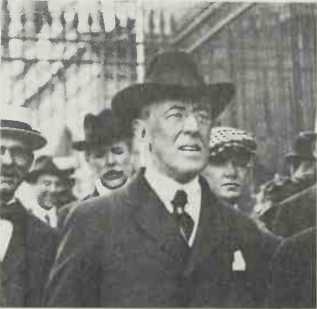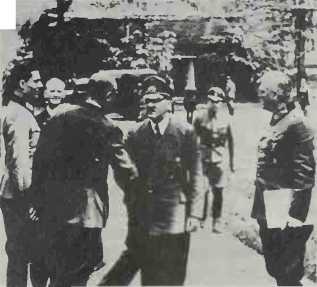
Wilson; “Fourteen Points” for peace
Connections and impressed Lloyd George who succeeded Asquith as Prime Minister in December 1916 and found Wilson a useful ally in his efforts to reduce the influence of Haig and Robertson. Thus, after brief spells in a variety of posts in Russia, France and England, Wilson was chosen, in November 1917, as Britain’s Permanent Military Representative on the Allied Supreme War Council at Versailles, a coordinating body of a type he had long advocated. Its acceptance of Wilson’s proposal for an Allied general reserve, controlled from Versailles, precipitated Robertson’s departure in February 1918 and Wilson succeeded him as ciGS. Manpower problems and the need to balance the demands of the various theatres were among his main concerns in the months before the Armistice. With the advent of peace his relationship with Lloyd George cooled, not least because of the Prime Minister’s Irish policy. Wilson retired in February 1922 and was elected MP for North Down. Known as a strong Unionist sympathizer, he was killed by Irish republicans outside his London home on June 22 1922. PJS.
Wilson, President Woodrow
(1856-1924). US. Although obliged to sanction military operations on the border with Mexico, Wilson’s foreign policy was dominated by the maintenance of the United States’ neutrality in World War 1. He offered to mediate between the belligerents but his isolationist policies were paramount. However the US was inexorably drawn into the conflict. Germany’s announcement in January 1917 of the resumption of unrestricted submarine warfare resulted in the severance of relations between the two countries. Matters further deteriorated in February with the disclosure of the contents of the Zimmermann telegram and public opinion now clearly swung in favour of the Allies. With American ships being sunk and the Allied cause taking on a less autocratic aspect with the abdication of the Tsar, Wilson decided on war. On April 6 1917 Congress approved his request for a declaration of war on Germany and Wilson threw himself wholeheartedly behind the war effort, building up the US military forces and war economy. In January 1918 he announced his blueprint for peace, outlining Fourteen Points that he felt would resolve disputes between the warring nations and establish a stable base for future international relations. This was perhaps Wilson’s apogee for, although he received popular acclaim on his visit to Europe at the end of hostilities, the pragmatic and nationalistic interests of other statesmen undermined his plans. He had little choice but to accept a series of compromise treaties at the Paris Peace Conferences, consoling himself that the formation of the League of Nations would remedy any faults. However, his hopes were dashed by the US Senate’s refusal to ratify the Treaty of Versailles and therefore his country remained outside the League. A broken man, Wilson’s health collapsed and he played little further part in political affairs. MS.
Window. Metalized strips of paper dropped from aircraft in massive quantities to swamp enemy radar. Known in Germany as “Angel’s Hair”. First used by Bomber Command in July 1943. See also chaff.
Wingate, Maj Gen Orde Charles
(1903-44). Br. Devoted to the Old Testament of the Bible, his first independent command, Operation “Gideon”, was in Palestine, 1936— 39 when he led Jewish irregulars against Arab guerrillas. In 1941, as a Lt Col, he led Ethiopian guerrillas for Haile Selassie against the Italians, killing and capturing large numbers. He attracted Churchill’s attention and was sent to India in 1942 as a brigadier to organize the force which became known as the Chin-dits. Wingate attracted great devotion and intense dislike, the latter predominating. After the succe. ss of the first Chindit operation, a second on a wider scale with much improved support facilities was organized. Soon after it was launched in March 1944, Wingate (now Maj Gen) wanted to fly from Im-phal to Comilla, the rear headquarters. He ignored a meteorological warning and took off: he was killed when his plane crashed in the jungle. HT.
Wireless Ridge. One of the Argentinian defence positions overlooking Port Stanley in the Falk-lands War of 1982. Defended by the 7th Marine Regiment, it was taken by 2 Para on the night of June 13.
Wisconsin. US battleship. Iowa class. Completed 1944, served in the Pacific and now back in ser-
Wolff, Gen (Oberstgruppen-fuhrer, SS) Karl Friedrich Otto
(1900-1984). Ger. SS and Police Commander in Italy, who negotiated the surrender of all German forces in Italy on May 2 1945.
Wolf packs. German term for coordinated attacks by groups of submarines, usually at night and on the surface. Developed by Dbnitz and used with great success 194043. Also used by American submarines in the Pacific with smaller groups and great success.
Wolfs Lair (a loose translation of Wolfsschanze). Codename for Hitler’s headquarters at Rastenburg in East Prussia from which he directed operations in the latter half of the war. Also the scene of the assassination attempt of July 20 1944.
“A wolf in his lair”: Hitler at Rastenburg





 World History
World History









